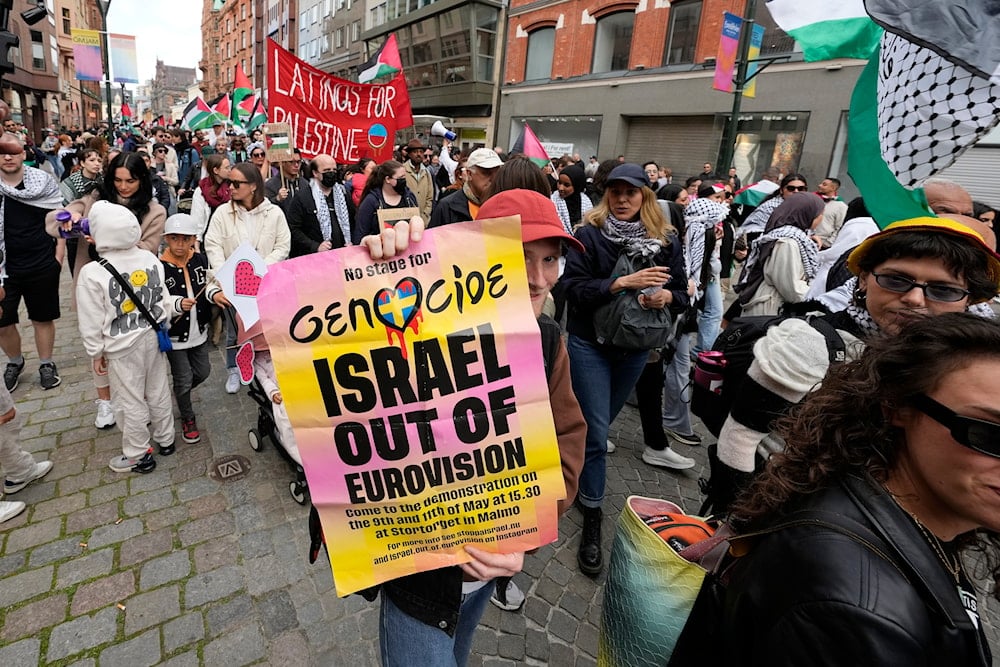Spain broadcaster urges debate on Israeli Eurovision participation
Spain’s public broadcaster RTVE has called for a debate over "Israel's" participation in this year’s Eurovision Song Contest, citing concerns over the ongoing Israeli war on Gaza.
-
 Pro-Palestine demonstrators march during a protest against the participation of Israeli contestant Eden Golan ahead of the final of the Eurovision Song Contest in Malmo, Sweden, on Saturday, May 11, 2024
Pro-Palestine demonstrators march during a protest against the participation of Israeli contestant Eden Golan ahead of the final of the Eurovision Song Contest in Malmo, Sweden, on Saturday, May 11, 2024
Spain’s public broadcaster RTVE announced Friday that it has formally called for a discussion about “Israel’s” participation in this year’s Eurovision Song Contest, citing growing unease over the ongoing war on Gaza.
RTVE said it had sent a letter to the European Broadcasting Union (EBU), which organizes the event, “requesting a debate on the participation of Israeli public television (KAN)” in the contest. The statement emphasized that while RTVE “reiterates its support” for the Eurovision event, it also “acknowledges the concerns that the situation in Gaza and the participation of KAN public television are raising within Spanish civil society.”
“It would be appropriate for the EBU to recognize the existence of this debate and provide a forum for discussion between EBU member broadcasters on the participation of Israeli public television,” the statement continued.
This year’s Eurovision will be held in Basel, Switzerland, at the St. Jakobshalle arena, with semi-finals scheduled for May 13 and 15 and the final on May 17. If KAN is excluded from the event, “Israel” will be absent from the competition altogether.
Wider context
Spain has become one of the most outspoken critics of "Israel" in Europe since the outset of the ongoing Israeli assault on Gaza, widely described by rights groups and observers as a genocide. Since October 7, the brutal Israeli aggression has claimed the lives of 51,000 Palestinians — the overwhelming majority of them women and children. In a move signaling its strong political stance, Madrid formally recognized the State of Palestine earlier this year, positioning itself at the forefront of European efforts to confront what it views as systematic violations of international law and human rights in the occupied territories.
Public anger over “Israel’s” participation in Eurovision isn’t limited to Spain. Thousands protested outside last year’s contest in Malmo, Sweden. Israeli singer Eden Golan, who competed then, was required to alter her song lyrics over perceived references to October 7. She ultimately finished fifth.
Other European broadcasters have also been urged to act. Finland’s Yle received two separate petitions in March demanding a boycott of “Israel’s” participation — one signed by over 500 cultural industry figures and another by more than 10,000 members of the public.
It is worth noting that Eurovision has, in the past, excluded countries from participation for political reasons.
In 2022, Russia faced exclusion from the competition due to widespread criticism from various countries following the war in Ukraine. Russia did not participate in the competition the following year. At the time, the European Broadcasting Union (EBU) stated that they had no intentions of barring Russia from the event but later reversed their stance. The group claimed to have conducted extensive consultations with its members and decided based on a recommendation from the governing body of the Eurovision Song Contest.
Read next: Eurovision; microcosm of global disdain toward 'Israel' over Gaza

 3 Min Read
3 Min Read








